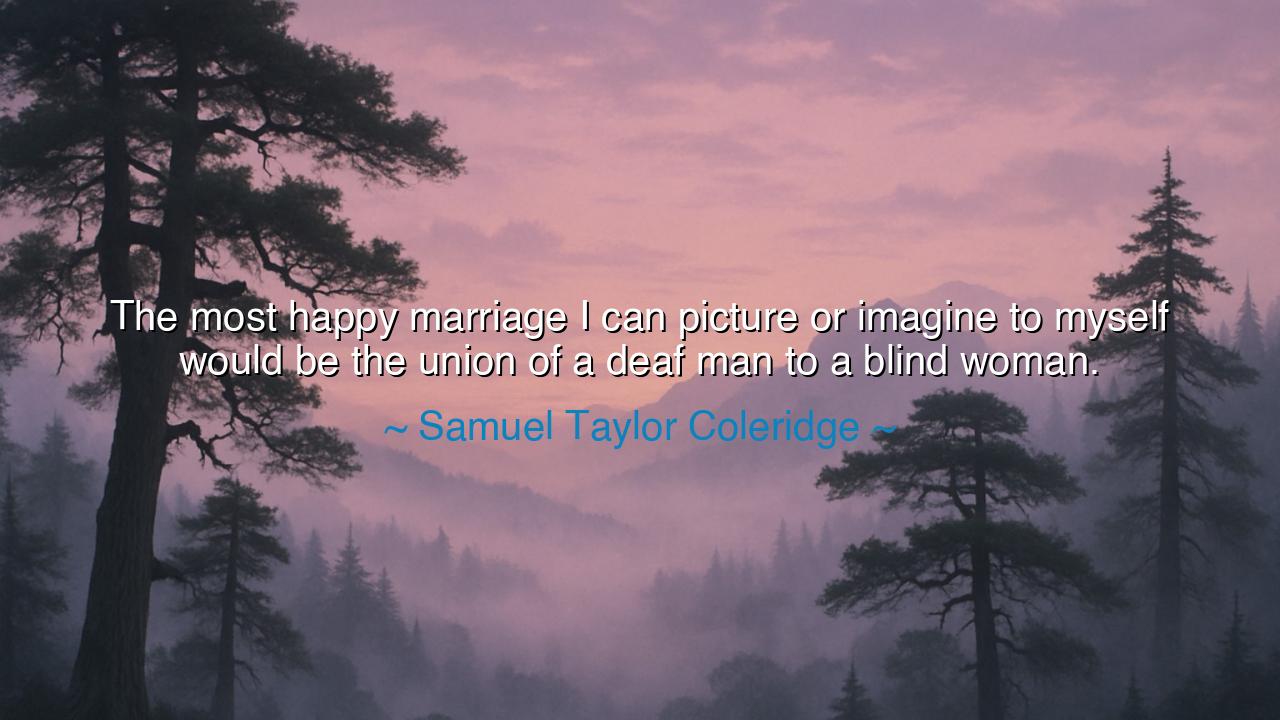
The most happy marriage I can picture or imagine to myself would
The most happy marriage I can picture or imagine to myself would be the union of a deaf man to a blind woman.






In the words of Samuel Taylor Coleridge, poet and dreamer of the Romantic age, we find this strange yet piercing reflection: “The most happy marriage I can picture or imagine to myself would be the union of a deaf man to a blind woman.” At first glance, these words seem cruel, as if love were a matter of deprivation. Yet beneath their irony lies profound wisdom about the nature of marriage, understanding, and the blindness and silence that true harmony sometimes requires. For Coleridge, ever the observer of human folly, saw that many of love’s wounds are inflicted not by malice, but by the unguarded word, the unkind glance, the endless scrutiny of one soul over another.
To be deaf and blind, in Coleridge’s imagining, is not to be cursed—it is to be shielded from the trivial cruelties that corrode affection. The deaf man does not hear the sharp tone of reproach; the blind woman does not see the frown of impatience. Each, in their limitation, is freed from the vanity and the noise that often poison love. Their union becomes a sanctuary of gentleness, where judgment cannot enter and where peace is born not of perfect understanding, but of merciful ignorance. Thus, Coleridge reminds us that happiness in union is not found in seeing and hearing everything—but in knowing when not to.
Through this lens, his words unveil a paradox that stretches through the ages: that love thrives not in total knowledge, but in reverent mystery. The ancients themselves understood this truth. In the tale of Orpheus and Eurydice, the great musician could not resist looking back to gaze upon his beloved before she crossed from the underworld—and by that single act of seeing, he lost her forever. So too, in many marriages, love falters when curiosity replaces trust, when the need to see and hear all eclipses the grace of silence and faith. To love, therefore, is sometimes to choose not to see, not to hear, but simply to believe.
It is said that the philosopher Socrates, when asked how to preserve peace in marriage, replied, “By remembering that silence is wisdom.” He, too, understood that the most enduring unions are not built upon the perfection of communication, but upon the mastery of restraint. Coleridge’s “deaf man” and “blind woman” are not figures of pity—they are symbols of wisdom. They teach that the eyes and ears, while gifts of the body, can become tyrants of the heart. To close them, at times, is to open something greater: the capacity to forgive, to understand without words, to love without measure.
Let us not mistake this message for one of ignorance. Coleridge does not call for blindness to truth or deafness to justice. Rather, he calls for mercy—to listen less to the noise of pride, to look less at flaws magnified by habit. How many quarrels, how many partings, might be spared if lovers could be “blind” to one another’s petty failings, “deaf” to one another’s passing irritations? The quote, though draped in humor, conceals a vision of tranquility—a love purged of vanity and freed from the petty burdens of the senses.
From this, the lesson to the living is clear: in all unions—whether of marriage, friendship, or kinship—seek first the peace of the heart before the perfection of the mind. When the tongue is too quick, let silence be your ally. When your eyes dwell too sharply on another’s fault, remember that love’s truest vision is compassion. To be “blind” in judgment and “deaf” to anger is not weakness; it is strength—the strength to preserve what is sacred amid the chaos of imperfection.
Therefore, dear listener, as you walk the road of companionship, carry Coleridge’s wisdom as both warning and blessing. Learn to see with the heart, not the eye, and to hear with the soul, not the ear. For the union of the deaf man and the blind woman is not a jest—it is a parable of peace. It whispers that love, when freed from the tyranny of perception, becomes pure, tranquil, and enduring. And so the poet’s strange vision stands as an eternal truth: sometimes, the happiest marriage is not between those who see and hear too much, but between those who have learned the art of gentle blindness and merciful silence.






AAdministratorAdministrator
Welcome, honored guests. Please leave a comment, we will respond soon